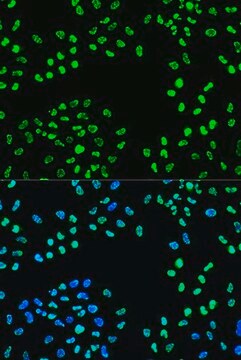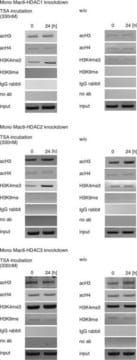05-457
Anti-Histone H1 Antibody, clone AE-4
clone AE-4, Upstate®, from mouse
Synonym(s):
H1 histone family, member 4, Histone H1b, histone 1, H1e, histone cluster 1, H1e
About This Item
Recommended Products
biological source
mouse
Quality Level
antibody form
purified immunoglobulin
antibody product type
primary antibodies
clone
AE-4, monoclonal
species reactivity
bovine, human, plant
manufacturer/tradename
Upstate®
technique(s)
ELISA: suitable
immunocytochemistry: suitable
western blot: suitable
isotype
IgG2a
NCBI accession no.
UniProt accession no.
shipped in
dry ice
target post-translational modification
unmodified
Gene Information
bovine ... H1-4(617854)
human ... H1-4(3008)
General description
Specificity
Immunogen
Application
5-20 µg/mL of a previous lot showed positive nuclear immunostaining in A431 cells fixed with 4% paraformaldehyde and methanol.
ELISA:
Recommended.
Epigenetics & Nuclear Function
Histones
Quality
Western Blot:
1-4 µg/mL of this lot detected histone H1 in lysates from an acid extract of HeLa cells.
Target description
Physical form
Storage and Stability
Handling Recommendations:
Upon receipt, and prior to removing the cap, centrifuge the vial and gently mix the solution. Aliquot into microcentrifuge tubes and store at -20°C. Avoid repeated freeze/thaw cycles, which may damage IgG and affect product performance.
Analysis Note
Nuclear extracts from NIH3T3 or HeLa cells.
Other Notes
Legal Information
Disclaimer
Not finding the right product?
Try our Product Selector Tool.
Storage Class Code
12 - Non Combustible Liquids
WGK
WGK 2
Flash Point(F)
Not applicable
Flash Point(C)
Not applicable
Certificates of Analysis (COA)
Search for Certificates of Analysis (COA) by entering the products Lot/Batch Number. Lot and Batch Numbers can be found on a product’s label following the words ‘Lot’ or ‘Batch’.
Already Own This Product?
Find documentation for the products that you have recently purchased in the Document Library.
Our team of scientists has experience in all areas of research including Life Science, Material Science, Chemical Synthesis, Chromatography, Analytical and many others.
Contact Technical Service








